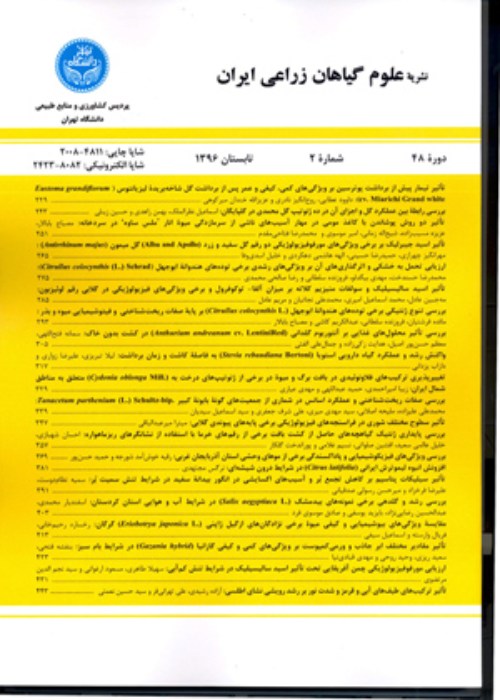Evaluation of Rapeseed Genotypes Using Heat Stress Tolerance Indices in Ahvaz Weather Conditions
Author(s):
Article Type:
Research/Original Article (دارای رتبه معتبر)
Abstract:
In order to evaluate the tolerance of rapeseed genotypes to heat stress, an experiment was carried out in the two crop years of 2018-2019 and 2019-2020 in the experimental farm of Shahid Chamran, University of Ahvaz, Ahvaz. The experiment was conducted as a combine analysis in the frame of a randomized complete block design with three replications in two conventional sowing dates (normal conditions) and delayed planting dates (stress conditions) on 9 rapeseed genotypes (including 8 hybrids and one free-pollinating variety). The results of combine analysis of variance showed that the seed yield of the genotypes differed with each other at the probability level of 1%. Also, there was a significant difference between the environments (conventional and delayed cultivation) in both years and the year effects. The average yield of genotypes under normal and stress conditions in the first year was estimated as 3.467 and 1.667 tons per hectare and in the second year as 3.358 and 1.687 tons per hectare, respectively. The increase in yield under normal conditions in the first year compared to the second year was due to more rainfall and more suitable temperature in the first months of cultivation. In this experiment, the stress intensity was estimated at 0.51 in the first year and 0.46 in the second year, which indicated high stress intensity during two years. The delay in planting followed by heat stress caused a 48% decrease in yield per unit area in average. The results of the analysis of indices based on grain yield showed that harmonic mean indices, stress tolerance index, geometric mean productivity, and average productivity are the best indices in assessing heat tolerance in rapeseed. And these four indicators had a positive and significant correlation with performance in both normal and stressful conditions. Drawing a three-dimensional diagram based on grain yield under stress and normal conditions and the selected indices showed that Hayola 50 and Hayola 61 hybrids are more heat tolerant than other cultivars and hybrids and have higher yield stability under heat stress conditions. Therefore, for areas with heat stress at the end of the growing season, Hayola 50 and Hayola 61 hybrids are more suitable than other hybrids and are recommended for cultivation in those areas.
Keywords:
Language:
Persian
Published:
Iranian Journal of Field Crop Science, Volume:54 Issue: 2, 2023
Pages:
47 to 58
magiran.com/p2602674
دانلود و مطالعه متن این مقاله با یکی از روشهای زیر امکان پذیر است:
اشتراک شخصی
با عضویت و پرداخت آنلاین حق اشتراک یکساله به مبلغ 1,390,000ريال میتوانید 70 عنوان مطلب دانلود کنید!
اشتراک سازمانی
به کتابخانه دانشگاه یا محل کار خود پیشنهاد کنید تا اشتراک سازمانی این پایگاه را برای دسترسی نامحدود همه کاربران به متن مطالب تهیه نمایند!
توجه!
- حق عضویت دریافتی صرف حمایت از نشریات عضو و نگهداری، تکمیل و توسعه مگیران میشود.
- پرداخت حق اشتراک و دانلود مقالات اجازه بازنشر آن در سایر رسانههای چاپی و دیجیتال را به کاربر نمیدهد.
In order to view content subscription is required
Personal subscription
Subscribe magiran.com for 70 € euros via PayPal and download 70 articles during a year.
Organization subscription
Please contact us to subscribe your university or library for unlimited access!



